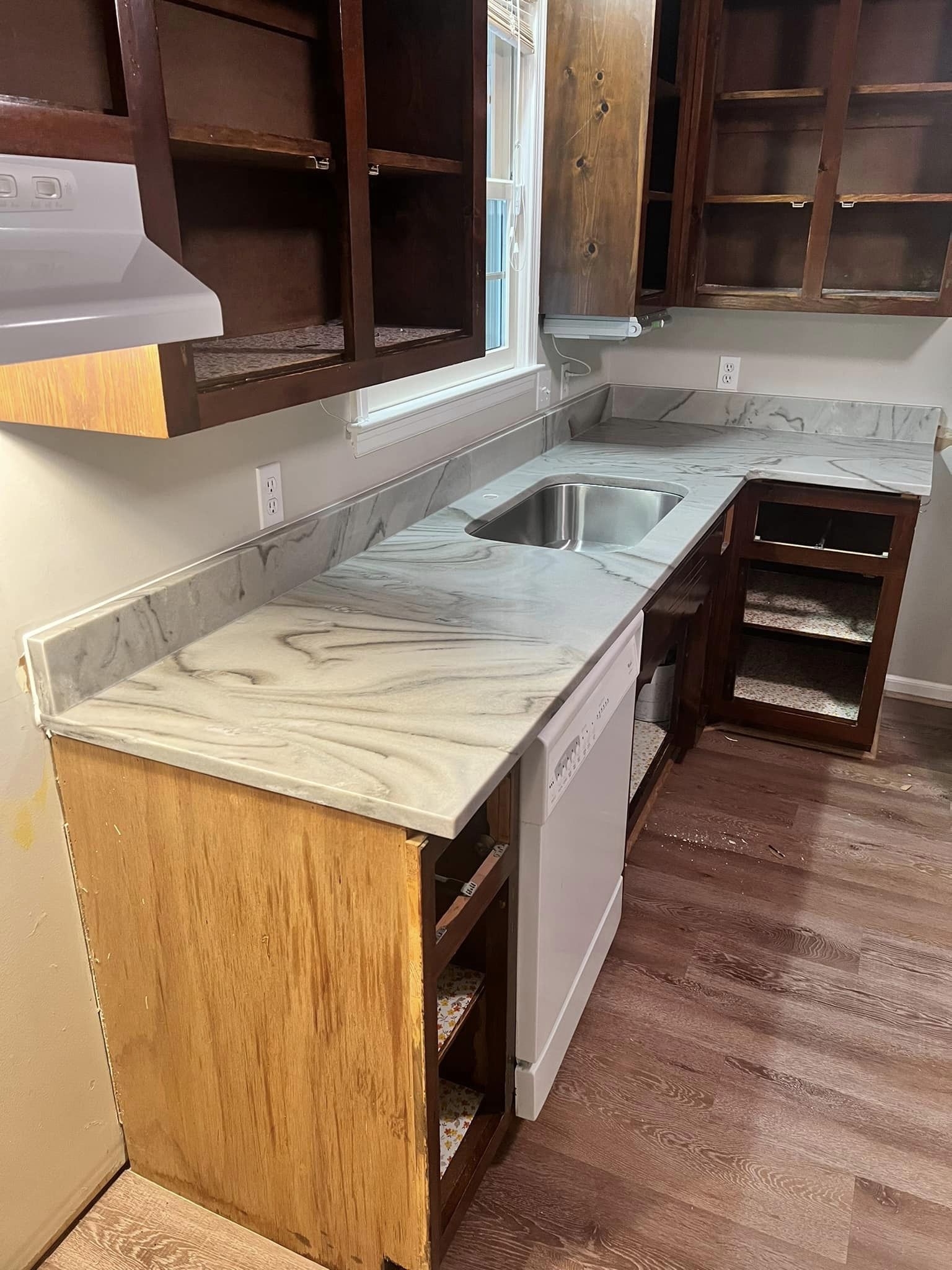
When it comes to choosing between granite and quartz for your countertops, it’s like standing at a crossroads with endless possibilities in front of you.
Each material has its unique set of advantages and considerations that can influence your decision.
Understanding the nuances of granite and quartz countertops will help you make an informed choice that perfectly suits your needs and preferences.
So, which path will you take in the domain of kitchen countertop decisions?
Key Takeaways
- Quartz countertops in Richmond VA offers durability and easy maintenance, while granite boasts natural strength and elegance.
- Consider design options and aesthetics, as quartz provides more variety, while granite offers unique natural variations.
- The environmental impact differs: granite is natural but considered quarrying, while
Pros and Cons of Granite Countertops
When selecting kitchen countertops in Richmond VA, granite offers a timeless elegance paired with durability and natural beauty. The installation process for granite countertops involves precise measurements and cutting to guarantee a perfect fit in your kitchen. Skilled professionals will carefully place the heavy granite slabs, securing them in place to create a seamless and polished look that enhances the overall aesthetic of your space.
One of the standout features of granite countertops is their exceptional heat resistance. This means you can confidently place hot pots and pans directly on the surface without worrying about damage. Whether you’re a passionate cook who loves experimenting with new recipes or someone who frequently entertains guests in your kitchen, granite countertops provide the perfect combination of style and functionality.
Imagine the satisfaction of hosting a dinner party and effortlessly moving between preparing dishes without having to use trivets or worry about damaging your countertops. With granite, you can enjoy both the beauty of natural stone and the practicality of a surface that can withstand the demands of a busy kitchen. Embrace the warmth and luxury that granite countertops bring to your home, creating a space where you can cook, entertain, and create lasting memories with ease.
Pros and Cons of Quartz Countertops
When choosing quartz countertops, you’re opting for a surface known for its durability and resistance to scrapes and stains.
Maintenance becomes a breeze with quartz, as it requires no sealing and simply needs regular cleaning to keep it looking pristine.
With quartz, you can enjoy a beautiful and reliable countertop without the hassle of constant upkeep.
Durability of Quartz
For those seeking a low-maintenance and durable countertop option, quartz stands out as a reliable choice with its exceptional strength and resilience. Quartz countertops are highly scrape-resistant, making them ideal for busy kitchens where accidental knife slips can happen. This durability guarantees that your countertops maintain their sleek appearance for years to come, giving you peace of mind.
Additionally, quartz boasts impressive heat tolerance and can withstand moderately high temperatures without sustaining damage. This feature is especially beneficial for avid cooks who frequently use hot pots and pans in their culinary endeavors. With quartz, you can enjoy both the aesthetic appeal of a beautiful countertop and the practicality of a surface that can endure the demands of daily use.
Maintenance Ease
With the durability of quartz countertops ensuring long-lasting beauty and functionality, let’s now explore the ease of maintenance these surfaces offer.
Quartz countertops require minimal maintenance, making them a popular choice for busy households. Cleaning techniques for quartz are simple; just use mild soap and water to wipe away spills and messes.
Unlike granite, quartz countertops are non-porous and don’t require sealing, reducing the effort needed to maintain them. Additionally, quartz countertops come in a variety of surface finishes, from polished to honed, allowing you to choose the look that best suits your style without compromising on maintenance ease.
This makes quartz an excellent option for those seeking a beautiful yet low-maintenance countertop solution.
Durability Comparison Between Granite and Quartz
When considering the durability of countertops, focusing on wear and tear as well as stain resistance is crucial. Granite is known for its natural strength and ability to resist scrapes, making it a durable choice for busy kitchens.
On the other hand, quartz offers excellent stain resistance due to its non-porous surface, ensuring a long-lasting and low-maintenance countertop option.
Wear and Tear
Comparing the durability of granite and quartz countertops reveals key differences that play a significant role in their wear and tear over time. Granite, known for its natural strength and heat resistance, is more prone to chipping and cracking than quartz.
Quartz, on the other hand, is engineered to be extremely durable, making it less susceptible to damage from impact. To maintain the longevity of your countertops, consider using cutting boards to protect against scrapes, and trivets for hot pots and pans.
Regularly cleaning with mild soap and water, avoiding harsh chemicals, and promptly cleaning up spills can help preserve the beauty of both granite and quartz countertops for years to come. Choose wisely based on your lifestyle and maintenance preferences to guarantee your countertops stand the test of time.
Stain Resistance
For a homeowner seeking countertops that offer superior stain resistance, understanding the durability differences between granite and quartz is essential.
Quartz, being engineered stone, is non-porous, making it highly resistant to stains from common household items like coffee, wine, and oil. Unlike granite, quartz countertops don’t require sealing to maintain their stain resistance. Cleaning techniques for quartz are simple, requiring only mild soap and water.
On the other hand, granite is a porous natural stone that, if not properly sealed, can absorb liquids, leading to stains. Regular sealing is vital to maintaining granite’s stain resistance.
When considering stain resistance, quartz offers a hassle-free option that requires less maintenance compared to granite, making it a practical choice for busy households.

Maintenance Requirements for Granite and Quartz
To keep your granite or quartz countertops looking pristine, regular cleaning and maintenance are essential. Both materials are durable, but they require specific care to maintain their beauty and functionality over time.
Here are some maintenance requirements for granite and quartz countertops:
- Cleaning Tips:
- For daily cleaning, use mild dish soap and warm water to wipe down your countertops. Avoid harsh chemicals or abrasive cleaners that can damage the surface.
- To remove stubborn stains on granite, create a paste of baking soda and water, apply it to the stain, cover it with plastic wrap overnight, then rinse it off the next day. For quartz, a non-abrasive surface cleaner should do the trick.
- Regularly disinfect your countertops, especially in high-traffic areas like the kitchen. Opt for a gentle disinfectant spray or a mixture of water and vinegar for a natural alternative.
- Sealing Requirements:
- Granite countertops need to be resealed every 1 to 3 years to maintain their stain resistance. To test if your granite needs resealing, place a few drops of water on the surface; if it doesn’t bead up, it’s time for a new seal.
- Quartz countertops, on the other hand, are engineered to be non-porous and generally don’t require sealing. Simply wiping them down regularly should suffice.
- Preventative Maintenance:
- Use coasters under glasses, hot pads under pans, and cutting boards for food prep to protect both granite and quartz from potential damage.
- Avoid placing hot items directly on quartz countertops, as extreme heat can cause discoloration or damage to the resin used in its production.
Aesthetics: Choosing the Right Look for Your Space
Discovering the perfect aesthetic for your space involves selecting a countertop that harmonizes seamlessly with your overall design vision and personal style. When considering the aesthetics of your countertop, two key elements to focus on are color coordination and design flexibility.
Color coordination plays a crucial role in creating a cohesive look in your space. Granite offers a wide range of colors and patterns, from classic whites and blacks to intricate veining in various shades. On the other hand, quartz provides an extensive selection of colors and finishes, including solid hues and patterns that mimic the look of natural stone. Whether you prefer a bold statement piece or a subtle complement to your existing decor, both granite and quartz can cater to your color preferences.
Regarding design flexibility, quartz takes the lead with its ability to be manufactured in a vast array of designs, including marble-like veining and solid colors. This allows for more customization options to suit your specific aesthetic preferences. Granite, with its natural variations, adds a unique touch to your space, bringing the beauty of nature indoors.
When choosing between granite and quartz for your countertop, consider how each material aligns with your desired color palette and design scheme to create a space that reflects your style and vision.
Recap
After weighing the pros and cons, it’s clear that choosing between granite and quartz is like deciding between a diamond and a ruby – both stunning options, but one shines brighter than the other.
With granite’s natural beauty and durability, it’s a timeless choice that will elevate any kitchen. Quartz, on the other hand, offers a sleek, modern look with unmatched resilience.
Whichever you choose, your countertop will be the crowning jewel of your space.
